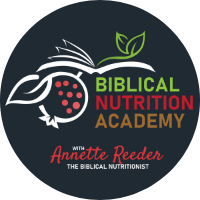
In the Old Testament, God gave His people incredibly specific laws about unclean food (Leviticus 11). Certain animals were called unclean, unfit even to touch once dead. These included swine, fish without fins or scales, bats, and many more.
Today, as Christians adopted and grafted into God’s family, we may read these Scriptures and find ourselves a little perplexed:
Does God still expect us to follow these laws? Are we absolutely prohibited from eating certain foods like pork? Or did Jesus declare all animals clean in the New Testament?
While our questions might initially arise from Scripture, praise the Lord they are also answered in Scripture!
In this article, we’ll first go through clean and unclean food in the New Testament.
Next, we’ll see how these puzzle pieces of Scripture fit together, revealing the beauty of creating a unique to you and God “recipe” for your life and health.
Let’s dive in.
What does the New Testament say about unclean foods?

One of the most life-changing Scriptures about unclean foods offered in the New Testament was spoken by none other than Jesus.
In the Old Testament and according to the Mosaic law, strict regulations had to be followed so that a man or woman could be considered “clean” or holy.
By the time of the New Testament, religious elders like the Pharisees upheld a number of traditions to safeguard their supposed holiness.
One of these was the washing of hands before eating. So enmeshed were these outer traditions with the state of one’s holiness that it was believed that eating with unwashed hands could defile a person.
But then Jesus did away with that.
BIBLICAL NUTRITION ACADEMY
Learn God's Recipe for Health Spiritually & Physically TODAY! NUTRITION FROM THE BIBLICAL PERSPECTIVE - eating, praying and fasting courses just for you.
Jesus covers the topic of unclean food in Mark 7:15:
“There is nothing from without a man, that entering into him can defile him: but the things which come out of him, those are they that defile the man.”
And in Mark 7:18, Jesus says: “Do you not perceive that whatever enters a man from outside cannot defile him, because it does not enter his heart but his stomach, and is eliminated, thus purifying all foods?”
Right then and there, a line was drawn in the sand:
Never again would God’s children have to fear defilement from things that enter into the body.
Nor would they have to fear that they would be deemed ceremonially unclean if they ate without washing their hands.
Instead, Jesus is showing us that it’s what’s in our hearts that matter. It’s our character and the automatic responses that come out of us that determine our spiritual condition.
Not the food we eat.
The following New Testament verses help highlight this wonderful reality.
Here’s another one.

The “Great Sheet Vision” Found in Acts 10
A well-known Scripture about clean and unclean foods in the New Testament is the “great sheet vision” found in Acts 10.
In it, Peter falls into trance where he sees a great sheet descending from heaven. Filling this sheet are all kinds of animals: wild beasts, creeping critters, and all sorts of birds.
Then he hears a voice: “Rise, Peter; kill, and eat” (Acts 10:10-13).
Peter’s initial response was a vehement no. After all, this was a Jewish man, raised in the customs of the Mosaic law, following its regulations. It was prohibited to eat unclean animals, and Peter had never so much as eaten a “common” or unclean thing (Acts 10:14).
But the voice persists: “What God hath cleansed, that call not thou common.” (Acts 10:15)
This is a Scripture that many Christians refer to when it comes to the question of clean and unclean foods.
But if we read on, we soon learn that this vision came as an illustration to Peter, showing him that he was not to call any man common or unclean. (Acts 10:28)
This vision had a profound significance and it turns out, it didn’t really have anything to do with food at all!
As a Jew, Peter believed it was unlawful for him to associate with or keep company with anyone of “another nation.”
But God had a plan, and the prophecy given in Hosea 2:23 (“Those who were not my people I will call ‘my people,’ and her who was not beloved I will call ‘beloved’") was about to be fulfilled.
Realizing the true meaning of the vision, Peter went on to baptize Cornelius, a devout gentile man, and all his household. These became the first non-Israelites to be baptized into God’s family and into the Church.
These non-Jewish converts to The Way brought further needed conversations to the New Covenant and we see these discussions in Paul’s letters.
Did Paul Eat Unclean Food?
The next Scripture that we find in the New Testament regarding the eating of animals is found in 1 Timothy 4.
In this chapter, Paul the apostle is instructing Timothy on the subject of false teachers.
False teachers teach falsely. And here we learn that one of the things they will teach falsely about is “abstaining from meats.” (1 Timothy 4:3)
In other words, making it a moral issue whether or not one consumes meat in their diet.
Paul asserts that God has created meat to be received with thanksgiving by them who believe and know the truth.
He goes on to say that every creature of God is good, and nothing to be refused, if it be received with thanksgiving. “For it is sanctified by the Word of God and by prayer.” (1 Timothy 4:3-5)
There are two ways we could interpret this passage.
The first is that Paul was referring to all animals as fit for consumption as long as we receive them in thanksgiving.
The second is that Paul was referring to all animals that God had previously approved as being fit for consumption.
Many Christians interpret these verses the first way and their conscience freely permits them to do so. Amen.
But what is Paul saying about eating unclean food?
Remember, Paul is talking about false teachers in this passage. According to Paul, one of their identifying features is that they will:
forbid believers from marrying
will command them to abstain from all meat.
Something God does not forbid.
If we zoom out further, we remember that all of God’s people had a standard already in place of what was considered clean meat and what was considered unclean meat. Basically, what was fit for consumption and what wasn’t fit for consumption.
If someone told us, “God created meat to be received with thanksgiving,” we would think of the meat that we know is edible, consumable, and safe to eat, like chicken, turkey, or fish. The meat He approved us to eat.
So, what Paul is talking about has less to do with what kinds of meats to eat, and more to do with just eating meat in the first place. In other words, he’s saying:
“Listen, false teachers are going to forbid others from marrying and from the eating of meat. You just remember this: God created meat to be received with thanksgiving. It’s good and nothing to be refused. The meat we eat is sanctified by the Word of God and by prayer.”
By slowing down and pondering the real meaning behind these Scriptures, we get a deeper, truer understanding of God’s heart behind it.
Let’s look at another one:
What foods are forbidden in the New Testament?
We know now that Peter’s vision was an illustration and we know that Paul’s admonition has to do with false teachers forbidding meat consumption. But does the New Testament ever forbid eating certain foods?
In Acts 15, a huge debate arose in the Church over whether or not the non-Israelite converts should have to keep the law of Moses (which included circumcision, keeping the Sabbath, and not eating certain foods).
The elders and apostles came to the conclusion that no greater burden should be laid on the Gentiles than to abstain from meat offered to idols (Acts 15:19-20; Acts 15:28-29).
This is the only place in the New Testament that forbids believers from eating certain foods.
Paul later clarifies and expounds on Christian liberty in both Romans 14 and 1 Corinthians 8, resolving what must have been a very divisive topic at the time: eating foods sacrificed to idols.
I encourage you to read both chapters for yourself, asking the Holy Spirit to illuminate the passages to you so you can receive God’s truths regarding the freedom He gives us!

Discerning God’s Heart for You
As with all “secondary issues,” praying through these passages, opening your ear and heart to what the Spirit is saying, is so necessary.
God loves you very much and because He cares about every aspect of your heart and life before Him, He does have counsel, guidance, and even commands about your health!
And these are life-giving when you receive them and pattern your life after them.
So, when approaching these Scriptures, leave preconceived ideas at the door. Sit down with Jesus and freely commune with Him as you read through these passages. Ask Him:
Lord, would you show me what Your heart is regarding my health? My diet? What things should I avoid? What things should I eat more of?
And when He shows you, listen! He knows more about your body and your cells, your whole genetic makeup than anyone else ever could. And He knows exactly which foods are most beneficial to you, and which are harmful.
So while some may come to differing conclusions on what the New Testament says about clean and unclean foods, know this:
Traditionally “unclean” foods and animals can’t defile us spiritually as was once believed, but the Bible has a standard and a pattern meant for our good.
By patterning our diet and the foods we eat according to Scripture, we can enjoy improved health and wellness, knowing that we are living as our loving God commands. He knows what’s best for us. Let us follow Him!
This list of foods in the Bible can provide further clarity as well.






I read many many scriptures in the New Testament regarding foods, mainly meet. At what we can eat, and what we are not supposed to eat, according to the word. I did not read what we are not supposed to eat in the New Testament, but there are many many people that think we’re not supposed to eat shellfish because they’re bottom, feeders, pork, etc. etc..
Wonderful. Thank you.
I really like how Eric spelled it all out. We are to follow everything in the Torah. If we “use” the “new testament” only, we would be walking blind, not knowing what the Word says. I guess that is why we are to follow our Messiah in every aspect, if we live as he lived, we will not go astray.
This is the best clarification that I have ever seen regarding food. Thank you!